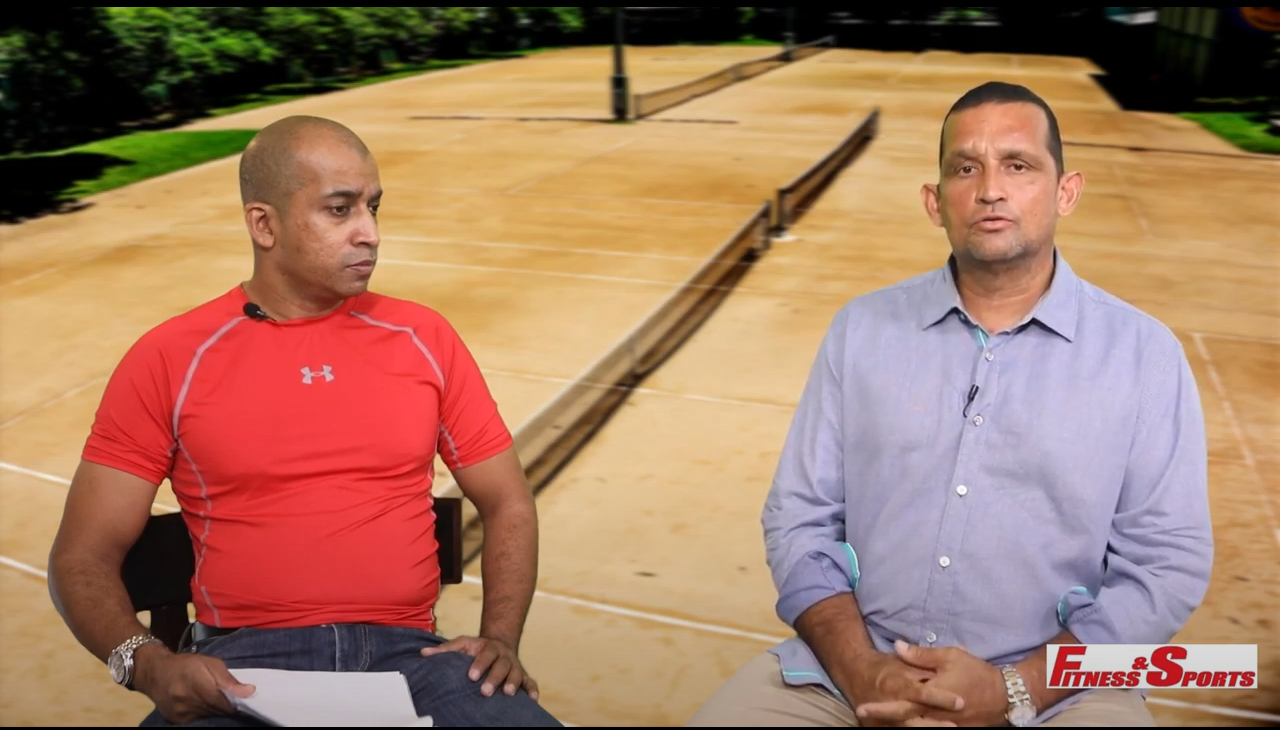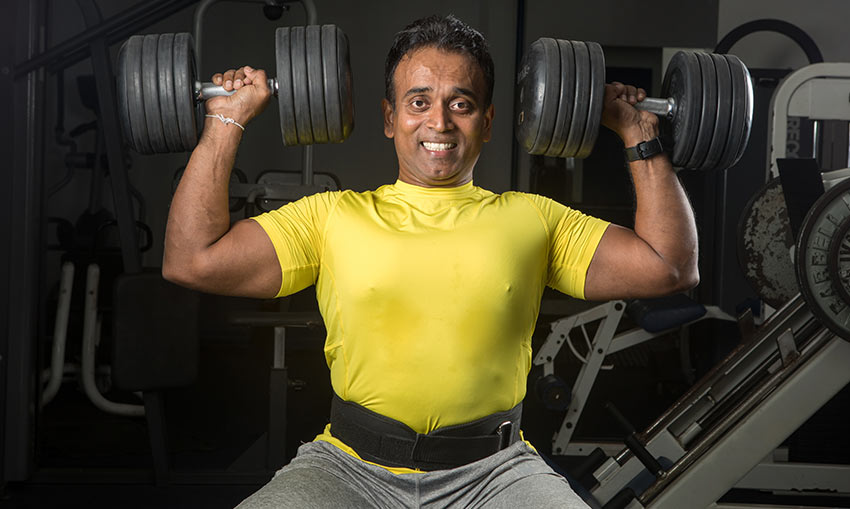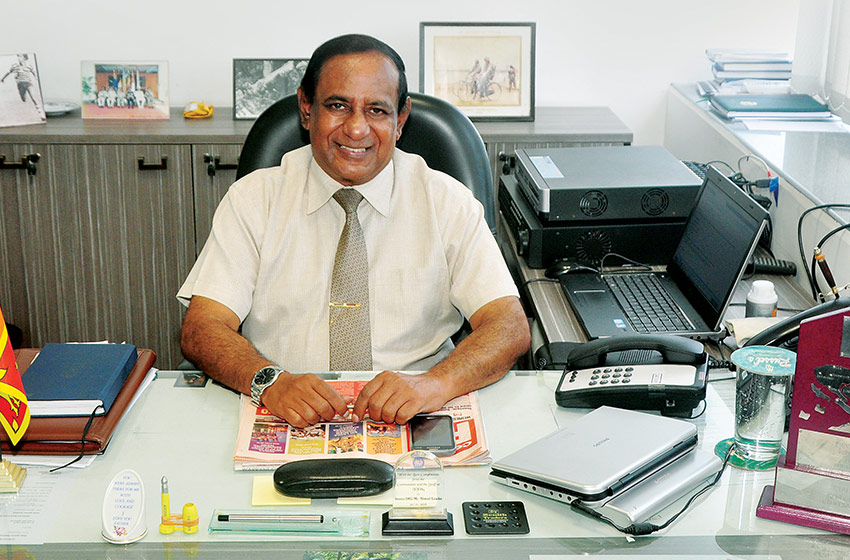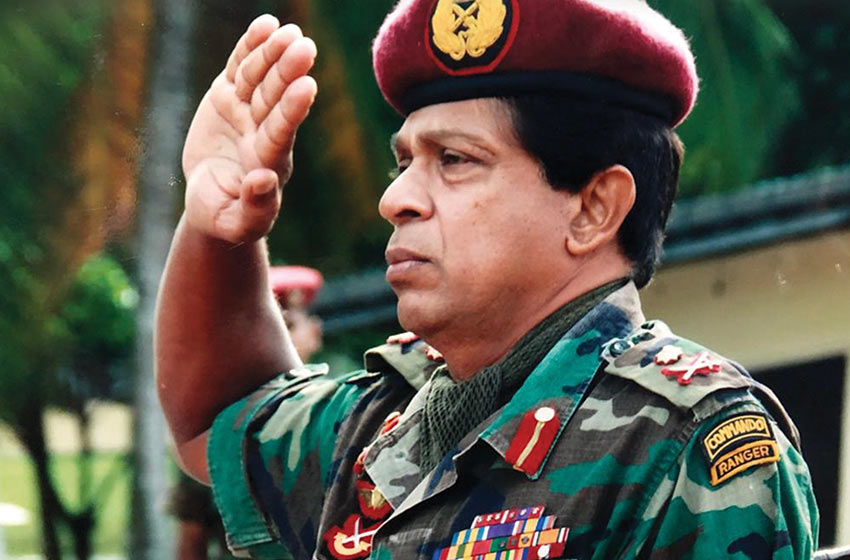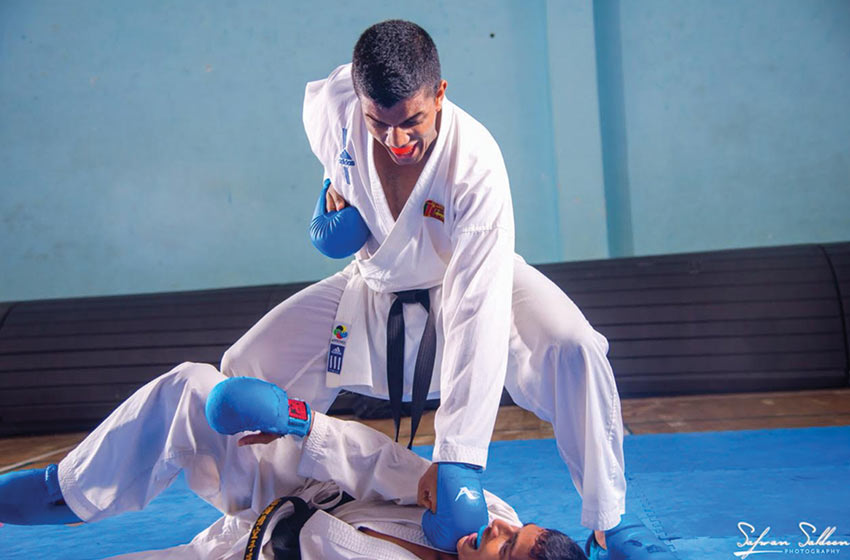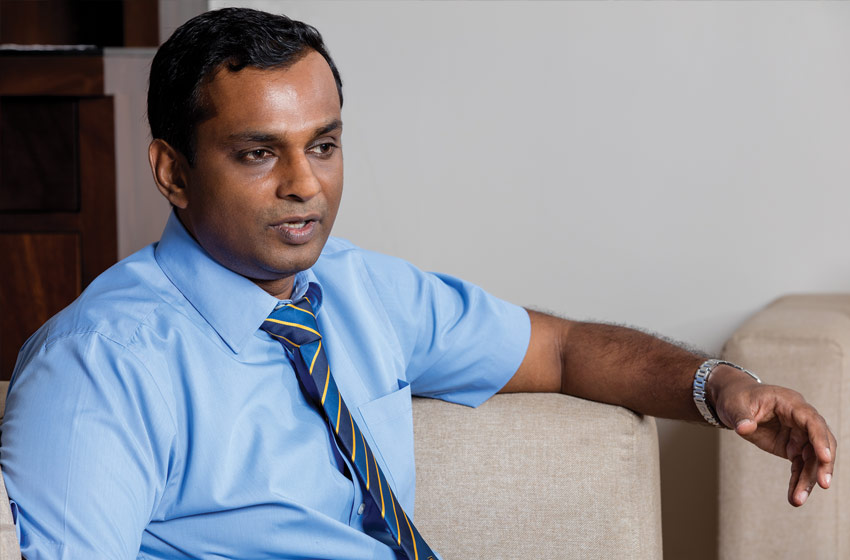
Warning: Illegal string offset 'single_ad_position' in /home/fitnessandsports/public_html/wp-content/themes/vinkmag/vinkmag/core/hooks/blog.php on line 187
Dr. Harindu Wijesinghe has been the President of the Sri Lanka Sports Medicine Association since 2014. He also heads the Doctors’ Panel for Sri Lanka Cricket which is involved in treating the majority of national cricketers in Sri Lanka and advising Sri Lanka Cricket in areas like injury prevention, treatment of injuries, and when players can return to the field after injury. He also heads the Doctors’ Panel of Royal College Rugby and serves on the Rugby Advisory Committee. Where he advises the college on developing rugby and about using the knowledge of sports medicine for the betterment of college rugby. At Royal College Dr.Harindu Wijesinghe had an illustrious school career captaining the 1st XV Rugby Team and was also the college Head Prefect. He is a Consultant Rheumatologist at Nawaloka hospital. The interview with Dr. Harindu Wijesinghe gives a very good insight into the field of sports medicine and rheumatology which is essential for athletes to have enjoyable and successful sports careers as well as for the general public to live an active and healthy life. 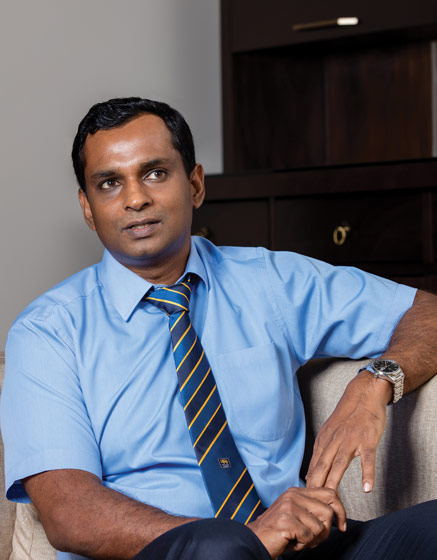 He gives very good advice for parents so their children will adopt a healthy lifestyle that will hold them in good stead throughout their life.
He gives very good advice for parents so their children will adopt a healthy lifestyle that will hold them in good stead throughout their life.
Fitness & Sports: What is sports medicine?
Harindu Wijesinghe: Sports Medicine is the use of medical knowledge including the knowledge of the human anatomy, physiology, pathology, nutrition and applying this knowledge into sports. What we sports doctors do is, first and foremost is to diagnose injuries. When an athlete or a layperson has an injury from doing exercise, we diagnose what the injury is. We first determine which part of the body is injured. We then further analyse whether it is a problem with the bone cartilage, ligaments, muscles or tendons. We use our clinical skills such as history taking and clinical examination and if necessary, we proceed to imaging such as Ultra Sound Scanning and MRI to diagnose the specific injury. Then we try to analyse why the athlete has got injured. After this analysis we come up with a suitable treatment, first is adequate rest followed by physiotherapy to stretch and strengthen the relevant areas and if needed we us drugs or injections to reduce the pain and inflammation. The sports doctors work with the physiotherapists to rehabilitate the athlete. We also use our knowledge for injury prevention in athletes such as getting proper training methods incorporated in the athletes’ training programmes. We work with the coaches with this aim in mind. Sports doctors also assist the athletes in areas such as nutrition, psychology/motivation to improve the athletes’ performance the natural way via proper training methods and good nutrition. A more recent aspect of sports medicine is exercise medicine where we use our knowledge of medicine and exercise to reduce non communicable diseases like diabetes, heart diseases etc. to promote a healthy lifestyle in the general population. These are the main aspects of sports medicine;
- Diagnosing the injury
- Preventing injury
- Improving athletes’ performance the natural way
- Promoting a healthy lifestyle in the general population
F&S: Tell us about your involvement in sports medicine?
HW: I have to first thank my father Dr. Wilfred Wijesinghe who is also a physician who took a great interest towards my brother and I in passing our exams and getting into the medical faculty. My father also encouraged us to play sports from a very young age. That led me to play rugby for my college. To this day my father takes an active interest in promoting sports. He runs a big school in Gampaha with a cricket ground, badminton courts and a swimming pool. Education, sports and medicine are his main interests so that is where I have got my love for sports medicine which brings sports and medicine together.
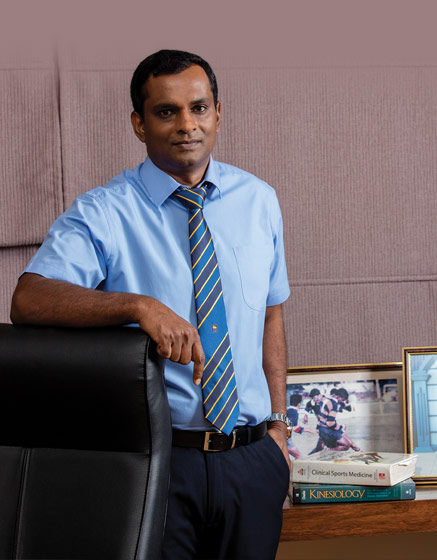 When I played rugby for college, I had the privilege of having two great coaches, one is Dr. Fred Perera and later Dr. Maiya Gunasekera. Playing rugby and being coached by gentlemen of high calibre along with my father inspired me to go on the path of both medicine and sports.
When I played rugby for college, I had the privilege of having two great coaches, one is Dr. Fred Perera and later Dr. Maiya Gunasekera. Playing rugby and being coached by gentlemen of high calibre along with my father inspired me to go on the path of both medicine and sports.
In university too I played rugby. When I passed out, I got involved in sports medicine because I was a doctor who had played sports. Whenever there were local and international sporting events held in Sri Lanka like the Rugby Junior Asiad in 2000, we were called in to work as doctors for these events and we got very good exposure from seeing international teams such as Japan, Korea etc. and observing how their doctors and physiotherapists worked. This showed me that there was a lot more to sports medicine than what we knew then. After passing out I had the privilege of working under Dr. Lalith Wijayaratne a consultant rheumatologist and while I was training in rheumatology he got me involved in the initial aspects of sports medicine. That was when I got involved in the Sri Lanka Sports Medicine Association for the first time. When Dr. Laltih Wijayaratne was the President, I was his Secretary. One of the luckiest things to happen to me in my life was when Dr. Wijayaratne directed me to Professor Siri Kannangara who is a well reputed rheumatologist and sports medicine specialist in Sydney, Australia. Professor Siri took me under his wing and he trained me in Sydney where I had the privilege of working in the New South Wales Sports Institute and also working with the West Harbour Pirates, a top class rugby club consisting of international players such as Lote Tuiquri. I also had the fortune of working with top class physiotherapists under the patronage of Professor Siri. In 2009, Professor Siri and I conducted a doping test for FIFA at the Australia Vs Uzbekistan Asian World Cup qualifier in Sydney. This experience gave me a very good idea about sports medicine because sports medicine in Australia is at a very high level and it was very different to what we had seen or practiced so this experience really enriched me and enhanced my knowledge and understanding about this field of medicine. It was a huge eye opener for me. After finishing my training in rheumatology and getting a good experience in sports medicine, I returned home to Sri Lanka.
In Sri Lanka I worked as a rheumatologist. The field of rheumatology gives a good base for a doctor to start out in sports medicine. As rheumatologists we treat diseases that affect our joints such as the spine, the neck, the elbows, the hips, the knees and the ankles. When it comes to sports medicine the majority of the injuries are to do with the joints. So that is how rheumatology and sports medicine tie in and that is how rheumatology helped me to do sports medicine. After returning to Sri Lanka in 2009, I was invited to head the Royal College Rugby Committee which I have been doing for the last seven years. I also got involved in Sri Lanka Cricket. While working in rheumatology I had the opportunity of seeing a lot of sports injuries and working with the Sports Medicine Association. I have been the President of the Sports Medicine Association since 2014 and also I have been involved with the Post Graduate Institute of Medicine where I helped develop the MD prospectus in Sports Medicine. In this period I worked as the Secretary of the Board of Studies for Sports Medicine. In this way I have been involved with both rheumatology and sports medicine ever since I returned from Australia in 2009.
F&S: You have had a very good rugby career playing for your Alma Mater Royal College, describe this experience and how it all began?
HW: After trying my hand at cricket, I realised I was not very good at it. When I was with one of my best friends in grade 8, Dilan Wickramasinghe who eventually became my Vice Captain, somebody said that they were looking for “big boys” to play rugby. So Dilan and myself went to rugby practice when the Master in Charge came up to us and said “Don’t play rugby to be fit, but be fit to play rugby”. That was
one of the first things I heard which had an impact on me. With that I started playing for the Under 15 team for Royal College, I was fourteen at that time. I started off playing in the line and shifted into the pack. I found that I was pretty good as a prop forward. The following year I managed to make the Under 17 team. Within two years I made the 1990 Royal College First XV side. Since then I played about 32 First XV matches including 3 Gunaratne Trophies, 4 Bradby Shields, 2 Milroy Fernando
Trophies and I ended up captaining the 1992 Royal College First XV Rugby team. Under my captaincy we managed to win a Gunaratne Trophy and we tied the Bradby Shield that year. I was also involved in coaching an unbeaten Under 17 team in 1994 and then I played rugby for the Colombo University team where we won the Inter University Trophy. I have been working with the Royal College Rugby Team as the head of the Medical Committee for the last seven years. That has been my involvement with rugby and it still continues.
F&S: What is your most memorable moment on the rugby field?
HW: The Thomians won’t like this, it was winning the Gunaratne Trophy in 1992. It was a turning point in my life, that’s why it was a memorable moment for me. Prior to that we had lost a few matches and our team was not doing too great. I have to thank my teammates who were wonderful. We all stood up and said “we don’t want to lose anymore, let’s make a stand and go out and play”. Our coach Dr. Maiya did a brilliant job of analyzing our strengths and weaknesses. We went up against a S. Thomas’s side that had been unbeaten for about 43 matches. For several school seasons the Thomians were unbeaten. Savantha De Sarem who had been my classmate when I was in S. Thomas’s Prep was their captain. We beat S. Thomas’s 10-3 and that was a historic match because nobody thought that day that we could beat that Thomian side, including ourselves. But we got the determination to change our lives and we did it. From that moment we had confidence and belief in ourselves and went on to hold an unbeaten Trinity College side which was unthinkable from the way we started the season but we did. That was a historic Bradby because it was the first ever tied Bradby. It was nil all and three all in both games. The Trinity side that we held was also unbeaten that year. Those two moments are the most memorable moments in my rugby career.
F&S: Many good rugby players have turned out to be magnificent doctors, is there a correlation here?
HW: I think it is not only in medicine, but in every sphere of life that rugby players have made great contributions. Dr. Maiya Gunasekera, Dr. Fred Perera are the doctors that come to mind, also my brother Dr. Chamara Wijesinghe who is a former rugby player for Royal College and a former Davis Cup tennis player. In the corporate world, the legal profession, government service and so on, you find many rugby players have reached the pinnacle in their respective professions and served the country immensely. Hon Mr. Malik Samarawickrama who was one of my coaches was an outstanding rugby player, coach and rugby administrator is a good example. Our current Governor of the Central Bank, Dr. Indrajit Coomaraswamy is a former rugby player as well. Rugby teaches you about life and it is a very quick way to learn about life. In our school we have a saying “We Will Learn Of Books And Learn Of Men” you can learn of books but when you play sports, especially a team sport like rugby you learn about men and of life. A few of the things that I learned from rugby is that you have to work hard. There is no substitute for working hard. You have to plan properly, you have to assess the strengths and weaknesses of your opponent, you have to know your strengths and weaknesses and plan accordingly. You must have the absolute will to win and not give up even if you go down and not to be disheartened but lift your spirit up, plan and regroup. You learn how to correlate and work with different people from different walks of life. When you put all that together, it is a lot of learning that you cannot get from reading a book. Rugby teaches you lessons that hold you in good stead in all aspects of life. Rugby players not only make good doctors but also make good men who can succeed in every sphere of life.
F&S: How important is playing sports during one’s school days, important to living a healthier adult life?
HW: Playing sports during one’s school days is very important, like I mentioned earlier my school’s motto, it is about learning of books and of men. Academic studies gives you just one aspect of education. During a season you learn a lesson every day during practice and at the match. It is much easier to learn important life lessons that sport teaches at school than to learn them later in life as an adult. Sport teaches children how to get along with each other, to cope with both victory and defeat, to play by the rules and how to behave which helps them as adults to live in society. Playing sports at school sets a fitness standard for children. Childhood obesity is on the rise and childhood obesity leads to adult diabetes and lot of different health problems. If children are participating in sports from a young age then the chances that they will continue exercising, eating a proper diet and living a healthier adult life is higher. Every single child should be encouraged to do sports whether at a competitive level or at a non competitive level for them to live a healthy life. The current recommendation is 1 hour of sport or physical activity every day.
F&S: What are the rewarding aspect of being a sports doctor?
HW: There are a lot of rewarding aspects. One aspect I find rewarding is that when you are treating sports people, 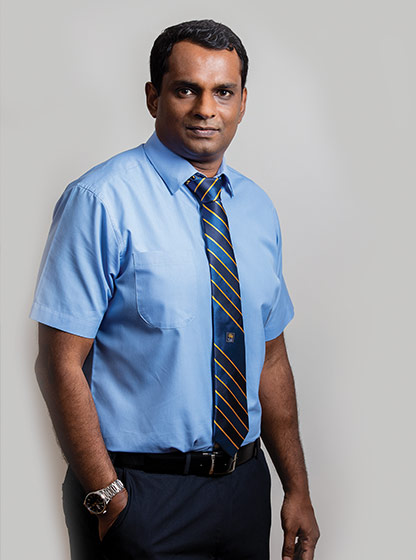 the complexity of the problem means that there are a lot of intricacies in diagnosing the problem and finding out what is wrong. Then we have to find out how to prevent this type of injury. Treating an athlete is like solving a crossword puzzle. The sports doctor has to be very knowledgeable and thorough because you must get the athlete fit enough to get back to the sport and prevent an injury from recurring. When you are able to help an athlete recover and to get back to the field that is very rewarding.
the complexity of the problem means that there are a lot of intricacies in diagnosing the problem and finding out what is wrong. Then we have to find out how to prevent this type of injury. Treating an athlete is like solving a crossword puzzle. The sports doctor has to be very knowledgeable and thorough because you must get the athlete fit enough to get back to the sport and prevent an injury from recurring. When you are able to help an athlete recover and to get back to the field that is very rewarding.
I also find it very rewarding as a sports doctor for the opportunity to work with great individuals such as Angelo Mathews, Lasith Malinga and Rangana Herath to name a few. They are such hardworking and dedicated individuals. When you watch them on the field you think that it comes easy for them but it is not so. They work very hard and they have a great attitude towards
life. A sports doctor tends to learn from great athletes about life as well. I have spent a lot of time with Angelo and Lasith and have learnt a lot from them. I have also run across some great coaches at Royal Collage and Sri Lanka Cricket. I also get to work with good sports doctors and good physiotherapists. The Sri Lanka cricket team has several top class physiotherapists. A sports doctor works with so many great individuals in such a complex field and you get to learn new things regarding medicine, regarding life and you get a reward from treating the athletes. The learnings I learn from practicing sports medicine helps me treat my patients in my rheumatology practice as well as helps me in my personal life.
F&S: With a busy schedule as an eminent doctor, how do you balance this with being a family man?
HW: I don’t think I balance this but my wife balances this for me. They say that a man needs two strong women to go up in life and I have two strong women, my wife and my mother. I met my wife when I was 18 and we have been together since. We have been married for almost 16 years and we have three lovely kids. From the day I began training to be a doctor she has done everything. She looks after the house, the kids, buying the groceries even paying the bills. So all I have to do is wear my clothes in the morning and go to work. When I come home from work I spend time with my kids. My mother also comes and helps us look after the kids. My wife is also a doctor but she has sacrificed her career to look after our family. I would not have done half of what I have done if not for the support of my parents initially, and later my wife.
To spend more time with my family, I cut down on social commitments. You cannot burn the candle from both ends. Whenever I get time away from my work, I try to spend it with my family. This is how I balance my life.
F&S: Your words of advice to the parents of school going children?
HW: Being a friend to your children parents of school going children? HW: Being a friend to your children is very important. I learnt this from seeing a lot of patients including children. The other thing is knowing that studies and sports are both equally very important. Do not sacrifice one for the other. When it comes to sports, we sports doctors always advice to do 2 or 3 sports before the age of 15. This is because it brings about cross fitness where the different sports complement each other in fitness and in skill. This brings an overall balance to the child’s fitness and coordination which help them in adult life. It is also important not to overdo this. I have seen parents run their kids to 4 or 5 different sports which is detrimental to the child. Ideally 2, maximum 3 sports, before the age of 15. After the age of 15 let the child select 1 sport to pursue unless they are exceptional, and are good at 2 sports.
It is important that proper nutrition and fitness are practiced at home. It is the role of the parents to see that the kids eat healthy food, get good exercise and get a good night’s sleep. If parents can srike that balance you will see the child succeed in life. Parents should not interfere with school activities, in the sense they should allow individual merit to take its course and not promote their children over other children. If parents feel there is favouritism involved, they should help their children to be more determined to peform better and surpass the obstacle of favouratism on their own. This was told to me by one of my teachers. Help your kids in every way at home but let them go out and do things on their own on the playing field. This will mould children into responsible and good citizens.
Warning: Illegal string offset 'single_ad_enable' in /home/fitnessandsports/public_html/wp-content/themes/vinkmag/vinkmag/core/hooks/blog.php on line 204
Warning: Illegal string offset 'single_ad_position' in /home/fitnessandsports/public_html/wp-content/themes/vinkmag/vinkmag/core/hooks/blog.php on line 205

